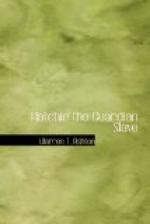“Pshaw! do not let avarice be your besetting sin. It is a vice too mean for your noble nature.”
Jaspar tried to sneer again, but the muscles refused to perform their office. He stood like a convicted demon before his sulphurous master.
“It must be done,” said De Guy; “there is no other way.”
Jaspar heard the words, and struggled to avoid the conclusion towards which they pointed. The demon bade him yield, and the command was imperative. He could not resist—his will was gone.
“What are the details of your plan?” gasped he, faintly.
“Marry the lady, and take up my abode in this mansion,” replied the attorney, promptly.
“And turn me out of doors! Well, be it so. I must do as you will.”
“Nay, nay, my dear sir; you wrong me. You shall still be the honored inmate of our dwelling,—the affectionate uncle of your Emily, as of old,” said the attorney, with infinite good humor.
Jaspar had well-nigh recovered his self-possession under the stroke of this, to him, severe satire; but De Guy gave him no time.
“We must proceed in some haste,” continued the attorney, seizing a pen, and writing as he spoke. “My time is short, and I have already been somewhat lavish of it. Here, sign this paper; it is your consent to my union with your niece. Call some one to witness it.”
Jaspar signed the certificate, without reading it. A witness was called, and the paper in due form was deposited in De Guy’s pocket.
“Now, sir, the lady is not altogether willing to consent to this arrangement; but you must persuade her, and, if need be, compel her, to consent. She will be here in a few days. After the marriage, it will only remain for me to make over to you one-third of the property, which, as her husband, I can then legally do. Be firm, and behave like a man, and your troubles are ended. Everything will be hushed up, and you can spend the evening of your days in peace and quiet. I bid you good-day.”
The attorney formally and politely ushered himself out of the library, and took his departure for New Orleans.
CHAPTER XXVII.
“Jaffier, you’re free; but these must wait for judgment.”
OTWAY.
We left Dalhousie engaged in the seemingly hopeless task of undermining the wall of the slave jail, at which he labored for several hours, resting at intervals, as his exhausted frame demanded. The prospect of realizing his hope encouraged him, and lent an artificial strength to his arm. He had already excavated a pit several feet in depth, but had not reached the bottom of the foundation wall. The quantity of earth piled upon the brink of the pit required extra exertion to remove it, but he toiled on with the energy of despair.




